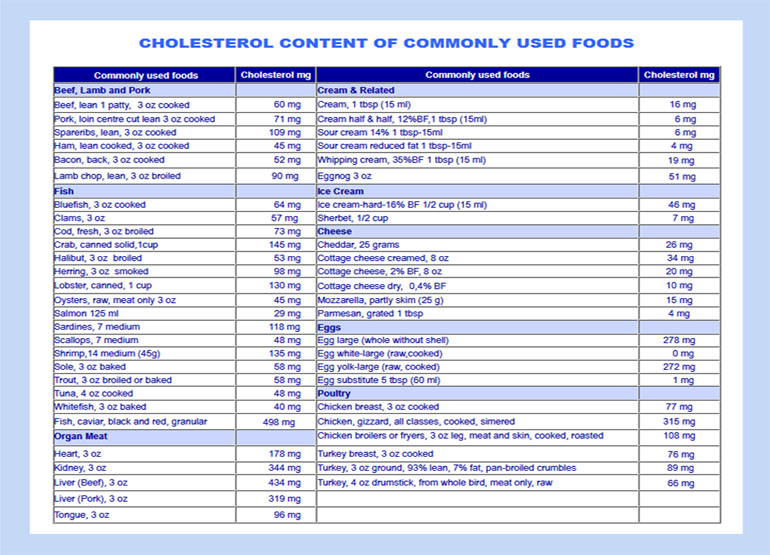Health Pages
Reduce Dietary Cholesterol
Reduce Dietary Cholesterol
Dietary cholesterol is found only in foods of animal origin. By reducing your total intake of fats, especially trans-fats and saturated fats, you will automatically reduce the quantity of cholesterol in your diet. Your doctor or dietitian can tell you how much dietary cholesterol you can include in your meal plan.
Keep in mind that healthy diet is very important, but be flexible; compensate for indulgences in your meal plan by eating less fat and smaller portions in your next meal. Put this advice into practice even when you go out for a meal.
Be sure to recognize your accomplishments and make a note of where you still want to improve. Focus on a positive and set realistic goals.
Try to record what you eat and drink, with portion sizes, because that will help you to calculate how much of each ingredient you ate.
Beware of hidden fats: crackers, cookies, croissants, danishes, doughnuts and pastries, cold cuts, breaded or battered foods and convenience meals often contain a high proportion of fat.
Use less margarine, butter, oil, mayonnaise, rich sauces and salad dressings; look for brands that are either lower in fat or fat-free.
Have healthy snacks!
Here are some snack suggestions:
- Raw vegetables and low-fat yogurt dip
- Baked kale or zucchini chips
- Red bell pepper with cottage cheese
- Baked banana chips
- Whole wheat breadsticks
- Dried or fresh fruits,
- Fruit leather
- Low-fat fruit yogurt
- Carrots and hummus
Reward yourself for doing well ... treat yourself to a special magazine or book.
Did You Know?
Related Info:
 Cholesterol Content of Commonly Used Foods
Cholesterol Content of Commonly Used Foods
 Triglycerides
Triglycerides
 Meat & Meatless Cooking
Meat & Meatless Cooking
 Making Change
Making Change
 About Fats
About Fats
 Fat Facts
Fat Facts
 Low Fat Diet
Low Fat Diet
 Fat and Fibre Tips
Fat and Fibre Tips
 Fat Scoreboard
Fat Scoreboard
 Test Your Fat I.Q.
Test Your Fat I.Q.
 Set Your Goals
Set Your Goals
 Eating Well
Eating Well
 Healthy Eating
Healthy Eating
 DASH Eating Plan
DASH Eating Plan
 Watch Your Salt
Watch Your Salt
 Learn How to Season Your Food Without Salt
Learn How to Season Your Food Without Salt
 Start Cooking
Start Cooking
 Did You Know?
Did You Know?
 Diet and Eating Out
Diet and Eating Out
 Take the Quiz
Take the Quiz
 Healthy Eating Recipes
Healthy Eating Recipes
 Heart Disease
Heart Disease
"Improving the way you live may take a little extra effort, but it's worth it!"



